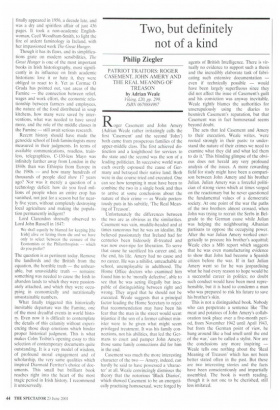Two, but definitely not of a kind
Philip Ziegler
PATRIOT TRAITORS: ROGER CASEMENT, JOHN AMERY AND THE REAL MEANING OF TREASON by Adrian Weale Kiang, .L20, pp. 299, ISBN 0670884987 Roger Casement and John Amery (Adrian Weale rather irritatingly calls the first 'Casement' and the second 'John') both came from prosperous families of the upper-middle class. The first achieved distinction and a knighthood for services to the state and the second was the son of a leading politician. In successive world wars each overtly espoused the cause of Germany and betrayed their native land. Both were in due course tried and executed. One can see how tempting it must have been to combine the two in a single book and thus to arrive at some conclusions about the nature of their crime — as Weale portentously puts in his subtitle, 'The Real Meaning of Treason'.
Unfortunately the differences between the two are as obvious as the similarities. Casement was vain, muddle-headed and at times rancorous but he was an idealist. He believed passionately that Ireland had for centuries been hideously ill-treated and was now over-ripe for liberation. To serve that cause he sacrificed his career and, in the end, his life. Amery had no cause and no career. He was a nihilist, unteachable at school, unemployable in adulthood. The Home Office doctors who examined him found him to be 'morally defective', able to see that he was acting illegally but incapable of distinguishing between right and wrong. They urged that he should not be executed. Weale suggests that a principal factor leading the Home Secretary to reject that recommendation may have been his fear that the man in the street would scent injustice if the son of a former cabinet minister were to be given what might seem privileged treatment. It was his family connections, not his abilities, that led the Germans to court and pamper John Amery; those same family connections did for him in the end.
Casement was much the more interesting character of the two — Amery, indeed, can hardly be said to have possessed a 'character' at all. Weale convincingly dismisses the theory that the notorious 'Black Diaries', which showed Casement to be an energetically practising homosexual, were forged by
agents of British Intelligence. There is virtually no evidence to support such a thesis and the incredibly elaborate task of fabricating such extensive documentation — even if technically possible — would have been largely superfluous since they did not affect the issue of Casement's guilt and his conviction was anyway inevitable. Weale rightly blames the authorities for unscrupulously using the diaries to besmirch Casement's reputation, but that Casement was in fact homosexual seems beyond doubt.
The acts that led Casement and Amery to their execution, Weale writes, 'were rooted strongly in their pasts: to understand the nature of their crimes we need to examine what they did and what led them to do it.' This blinding glimpse of the obvious does not herald any very profound analysis of the issues. A more rewarding field for study might have been a comparison between John Amery and his brother Julian. Julian Amery was a forceful politician of strong views which at times verged on the reactionary but he never questioned the fundamental values of a democratic society. At one point of the war the paths of the two brothers almost crossed, when John was trying to recruit the Serbs in Belgrade to the German cause while Julian was helping the neighbouring Albanian partisans to oppose the occupying power. After the war Julian Amery worked energetically to procure his brother's acquittal; Weale cites a MI6 report which suggests that he was even manufacturing evidence to show that John had become a Spanish citizen before the war. If in fact Julian Amery went so far he was jeopardising what he had every reason to hope would be a successful career in politics; no doubt such conduct would have been most reprehensible, but it is hard to condemn a man who was prepared to risk his future to save his brother's skin.
This is not a distinguished book. Nobody who can perpetrate a sentence like 'The meat and potatoes of John Arnery's collaboration took place over a five-month period, from November 1942 until April 1943, but from the German point of view, he hung around like a bad smell until the end of the war,' can be called a stylist. Nor are the conclusions any more inspiring — Weale tells one nothing about the 'Real Meaning of Treason' which has not been better stated often in the past. But these are two interesting stories and the facts have been conscientiously and impartially assembled. The book is worth reading, though it is not one to be cherished, still less imitated.


































































 Previous page
Previous page